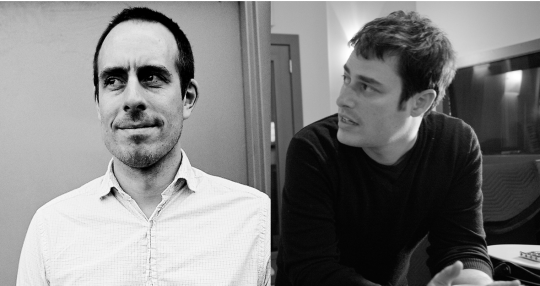
A Conversation between Ted Leo and Ben Arthur
Ted Leo is a songwriter and performer. His latest release is a self-titled album from The Both, a collaboration with Aimee Mann. Before that, his solo album, The Brutalist Bricks, was released by Matador. Ben Arthur has released six albums and two novels, and is a producer of the songwriting web series SongCraft Presents. His new album, Call and Response, is a collection of “answer songs,” which each respond to another track or artwork. Leo and Arthur are both writing an answer song in response to “Deceit,” a short story by the author Joyce Carol Oates, which they will perform at a live show/reading on June 27th in New York City.
BEN ARTHUR: You’ve just been touring out on the West Coast—how was it?
TED LEO: It was really nice. I did a Sonny and Cher style variety show with Aimee Mann, which—as the grind of normal touring has begun to offer diminishing returns in a lot of realms—is really fun for us to do now and then. And I did a few solo shows up and down the coast, just because I was there.
BA: Explain what you mean by the diminishing returns of the grind: more hustle and less income?
TL: Yeah, more hustle and less income. But also just, like, the older you get…when I say the grind, I don’t mean the actual shows. They’re rarely not rewarding. It’s not even that I mind traveling. I actually love traveling. But the day in and day out of loading in, and packing, and dressing rooms, and rooting around in your shoulder bag for the allergy pills you can’t find, or the charger you needed to bring. That kind of stuff.
BA: How does the variety show change that—it just adds variety?
TL: More or less, yeah! It puts what you’re doing in a different context. When you’re traveling on a body of songs that you have played for many, many years, for most nights of your life—I’m sure you’ve experienced this yourself—it’s not that every night is not it’s own thing. It is. You play the one song that people want to hear the most every night, and for every audience that’s a special thing. And usually that translates back to you. But I think that stumbling upon the idea that you can do something different with the…uh, what am I trying to say?
BA: With the addition of other elements, you can change—
TL: With the addition of other elements. And kind of recontextualizing the whole thing. I mean, Aimee and...
You have reached your article limit
Sign up for a digital subscription and continue reading all new issues, plus our entire archives, for just $1.50/month.
Already a subscriber? Sign in




